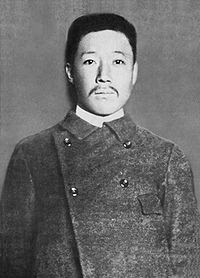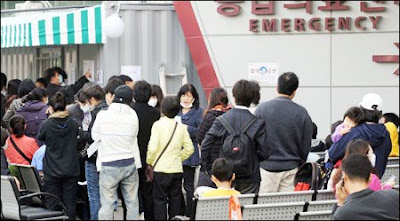the above is a hirohito fairytale, but folks, what we have here is a korea basher. anytime you see korea described as ‘the korean peninsula’, you got yourself a korea basher because the implication is clear; korea did not exist. there was no such thing as korea. there was only the korean peninsula. for example, if someone were to write, ’sumo probably came from china via the korean peninsula.’ , you got yourself a sophisticated hater of korea. he thinks himself sly, but he hath no clothes in the sunlight of reality; his choice of words doth betray him.Well, the "the Korean peninsula" hypothesis is an interesting one, but where does that leave me? I use that expression , if for no other reason than to provide a little variation between Korea, the ROK, South Korea, the Koreas, the South, and south of the DMZ, among others.
This would be the second time this week (one directly and this one indirectly) that my "Korean apologist" credentials have been called into question. Hmm... I wonder if I'm some Manchurian Candidate-like plant, whose presence has been engineered by the shrine keepers at Yasukuni, whose task is to build up an army of followers and then suddenly start messing their heads with over-the-top pro-Japan/anti-Korean stuff. I hope I'm at least getting a pension.
Like so many other pronouncements about Korea (or Japan), this one falls apart in its sweepingness or absoluteness. "Anytime" you see that, Pawikirogi? While I think a case could be made that it should raise the concern level from yellow to orange, let's say, it's by no means something that could be applied to anybody in any case.
This, of course, is one of your problems overall, Pawikirogi (and like the arrogant sombitch that I am, I'm assuming that Pawikirogi reads what I write just by the sheer will generated by me writing about him). You make these sweeping (I really like that word) pronouncements about "the expat" (or kyopos or some other groups) and don't grant that there could be exceptions. Many, much, a lot of, or even often or sometimes would be great modifiers that would enhance the veracity (and acceptance) of your words.
You often do have something important to say (just like wjk did), but you don't know how to say it.



 South Korea announces it will send troops to Afghanistan to protect its civilian aid workers (
South Korea announces it will send troops to Afghanistan to protect its civilian aid workers (






.jpg)

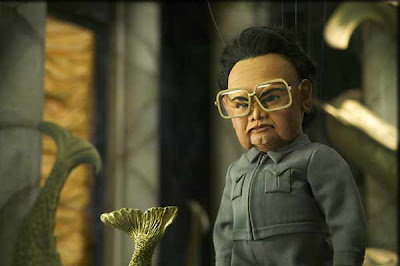

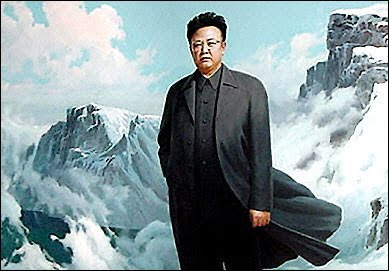









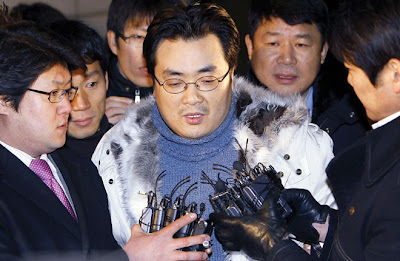



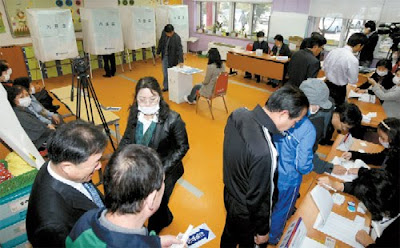
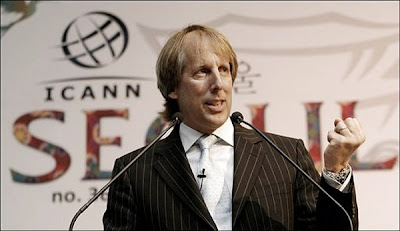




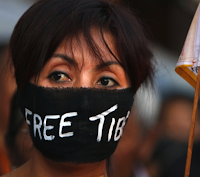 Chinese consulate in Houston apologizes for "unwarranted disruption by unaffiliated persons" of a rally aimed at seeking the release of death-row inmate Melvin Tibbs (Dallas Morning News)
Chinese consulate in Houston apologizes for "unwarranted disruption by unaffiliated persons" of a rally aimed at seeking the release of death-row inmate Melvin Tibbs (Dallas Morning News)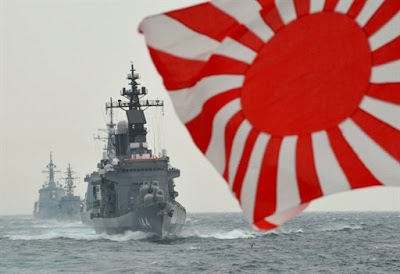
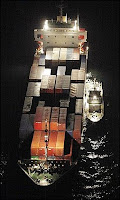



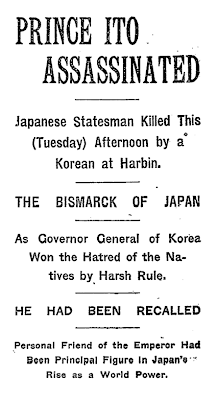
 A news bulletin reports that Prince Ito, one of the most powerful leaders of Japan, was assassinated today by a Korean in Harbin, Manchuria. “Prince Ito was 72 years old, and for years was one of the most conspicuous of Japan’s statesmen. Several months ago he was relieved of his work as Governor-General of Korea, in which post he had done much to pacify the country. By his arbitrary suppression of the insurrection he incurred the enmity of many Koreans who were opposed to Japanese rule…. The achievement above all others with which Prince Ito’s name has been associated in the minds of Occidentals was the framing of the imperial constitution by virtue of which Japan took her place for the first time in the rank of modern civilized states…. In some quarters it was believed that the tour of Prince Ito in Manchuria was to have been of a political nature and that it had as a basis an attempt to forestall the protests of the Powers against Russia’s domination of the Manchurian Railroad zone, under her agreement with the Chinese, by effecting a complete understanding between Japan and China.”
A news bulletin reports that Prince Ito, one of the most powerful leaders of Japan, was assassinated today by a Korean in Harbin, Manchuria. “Prince Ito was 72 years old, and for years was one of the most conspicuous of Japan’s statesmen. Several months ago he was relieved of his work as Governor-General of Korea, in which post he had done much to pacify the country. By his arbitrary suppression of the insurrection he incurred the enmity of many Koreans who were opposed to Japanese rule…. The achievement above all others with which Prince Ito’s name has been associated in the minds of Occidentals was the framing of the imperial constitution by virtue of which Japan took her place for the first time in the rank of modern civilized states…. In some quarters it was believed that the tour of Prince Ito in Manchuria was to have been of a political nature and that it had as a basis an attempt to forestall the protests of the Powers against Russia’s domination of the Manchurian Railroad zone, under her agreement with the Chinese, by effecting a complete understanding between Japan and China.”
